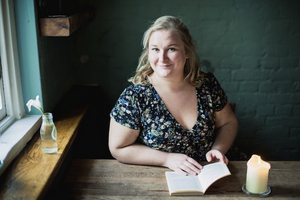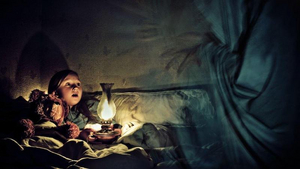Guest Blog: Rebecca Atkinson-Lord Invites You To Join In Staging Musical CAUTIONARY TALE

Growing up, amateur productions of musicals were pretty much the only theatre that I got to see or participate in with serious regularity. There was the Bilston Operatic society, the Tettenhall Operatic Society, Punch Theatre, Central Youth Theatre and hundreds of others. The 1990s West Midlands was a hotbed of brilliant musical theatre endeavour, and I spent every spare minute living and breathing musicals.
We all took it very seriously, approaching rehearsals with a rigour that rivalled any professional process I've been in since. It was a glorious community of shared passion and commitment, and even after 15 years of making theatre professionally, I still think of some of those shows as my very fondest theatre experiences. When I left to become a grown-up out in the wild world, I missed those surrogate families, but a Very Serious Masters Degree at RADA taught me to keep my love of musicals quiet in favour of my equally strong love of Shakespeare and "Serious Theatre".
But then, two years ago, my agent called to ask if I fancied writing and directing a show for a youth theatre. I was in the middle of a really painful break-up and I'd been suffering a fairly serious bout of depression for almost six months, so the idea of getting paid to spend two weeks in residence by the seaside sounded like a godsend.
It began with one song, "The Gloaming Alphabet", that Becky Applin, the composer, and I wrote at my kitchen table one afternoon. At first, it was a song about all the things in life we have to do that make us miserable, all the things we do that we'd like to change, and all the ways we'd felt squashed and bullied as children. The rest of the first draft of the show flowed out from that. I'd sit in rehearsals, writing scenes while Becky and our collaborator Mark Iles worked on the music and choreography. Then we'd slot in the new scene and try to make it all join up.
I thought those two weeks would be the end of it and that I'd go back to normal theatre-making life. But Becky's music is incredibly compelling, and I found myself singing the songs at odd times and wondering what happened to the characters. They just wouldn't leave me alone. At about the same time, I'd understood that I was depressed because I wasn't living authentically and I'd got too caught up with being who other people thought I should be instead of just myself.

I couldn't resist giving that experience to the people of Gloaming, which became a town filled with exceptional people who were forbidden to use their talents. Although the story had started as a kids' show, it became much darker and more complex as soon as I began to really think about what becomes of people who never get to do what makes them happy. I realised that that's how lots of people live their whole lives, and it felt really important to talk about the cost of that.
I spent the whole of the next summer avoiding unfulfilling work I was supposed to be doing by writing the book and lyrics at a rickety table in my back garden. By then, my excitement about writing the show had me feeling more hopeful about the world and that too made its way into the script. Like me, returning to the musical theatre world to feel inspired, the children of Gloaming find ways to use their special skills and in that, they find hope for the future.
At its heart, Cautionary Tale is a story about finding hope when all seems lost, so when our workshop was cancelled after years of work and fundraising because of the Covid-19 pandemic, there was no way we could give up. The show is all about the power of community to overcome difficulties, so asking people to help us stage it in lockdown by doing what they love is a perfect way to keep working on the show and try and find a future for it.
And for me, it feels fitting that we're including everyone in that request. From West End stars to kids dreaming in their bedrooms and folk warbling away in the shower, there's space for all of us to show off our talents and be valued. Just like the children of Gloaming.
Find out more about Cautionary Tale here
Comments

Videos
